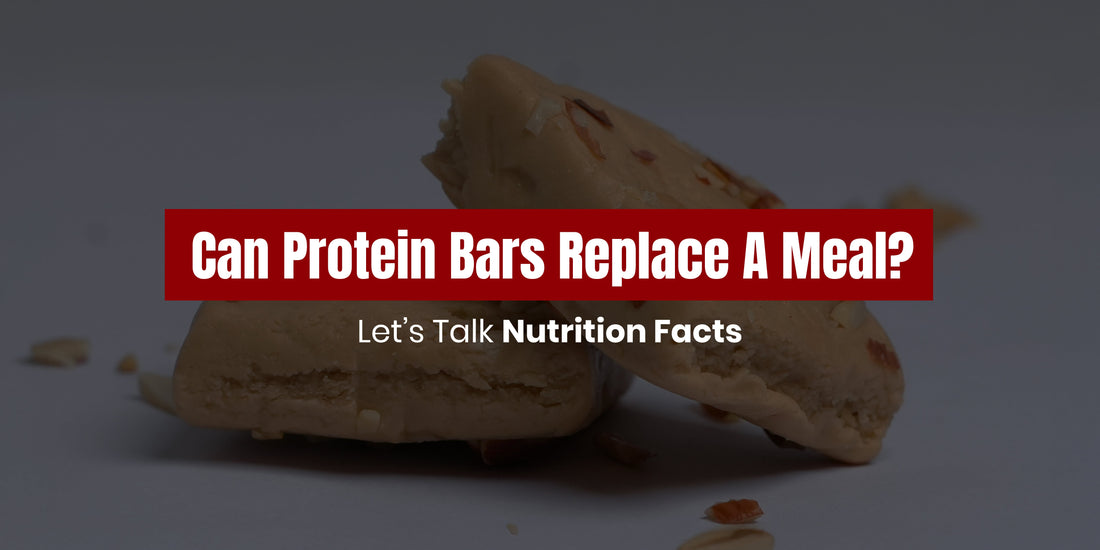
Can a Protein Bar Really Replace a Meal?
byIn the context of today's fast-paced environment, consuming a protein bar may appear to be a convenient option for individuals with busy schedules. However, it is important to consider whether a protein bar constitutes an appropriate substitute for a well-balanced meal. In this blog , we’ll dive into the nutrition facts, pros and cons, and expert recommendations to help you make an
What Is a Protein Bar?
A protein bar is a convenient, nutrient-dense snack typically designed to provide a substantial amount of protein (often 15–30 g) in a compact form. They’re popular among athletes, busy professionals, and anyone seeking a quick source of macronutrients without cooking.
Common Ingredients:
- Sources of protein include soy, pea, whey, casein, and mixed plant proteins.
- Carbohydrates: oats, rice crisps, or sugar alcohols
- Fats: nuts, seeds, or cocoa butter
- Fiber: chicory root, inulin, or added psyllium husk
- Flavorings and binders: cocoa powder, natural extracts, syrups
Meal Replacement vs. Snack: Key Differences
|
Feature |
Snack Bar |
Meal Replacement Bar |
|
Calories |
150–250 kcal |
250–400+ kcal |
|
Protein |
5–15 g |
15–30 g |
|
Carbs & Fiber |
Lower fiber, simple carbs |
Balanced carbs + added fiber |
|
Vitamins & Minerals |
Often minimal |
Fortified with essential micronutrients |
|
Purpose |
Quick energy between meals |
Replace a full meal when needed |
Nutrition Facts Comparison
|
Item |
Calories |
Protein |
Carbs |
Fat |
Fiber |
Key Vitamins/Minerals |
|
A Normal Meal (e.g. G. whole grain bread, chicken salad) |
500 kcal |
30 g |
45 g |
18 g |
8 g |
Vit A, C, K, calcium, iron |
|
Protein Bar A |
260 kcal |
20 g |
23 g |
12 g |
8 g |
Added B-vitamins, zinc |
|
Protein Bar B (meal replacement) |
350 kcal |
25 g |
35 g |
15 g |
10 g |
Fortified with 20+ vitamins/minerals |
Insight: While some “meal replacement” bars approach meal-calorie levels and are fortified, they may still lack the phytonutrients and variety of whole foods.
Pros of Using Protein Bars as Meal Replacements
- Convenience & Portability: No prep time, easy to carry in your bag or desk drawer.
- Calorie Control: Pre-measured portions help manage daily intake.
- High Protein Content: Supports muscle repair and satiety.
- Fortification: Many bars include added vitamins and minerals.
- Consistent Nutrition: Predictable macronutrient profiles.
Cons and Potential Risks
- Lack of Variety: Whole foods deliver a wider range of micronutrients and phytochemicals.
- Processed Ingredients: Some bars use sugar alcohols, artificial sweeteners, or hydrogenated oils.
- Cost: Quality bars can be more expensive per calorie than real food.
- Digestive Issues: High fiber or sugar alcohols can cause bloating or gas.
- Long-Term Sustainability: Relying solely on bars can lead to nutritional gaps.
Who Should Consider Protein Bars for Meals?
- Travelers and working professionals: When access to well-balanced meals is restricted.
- Athletes & Fitness Enthusiasts: Post-workout refuel when whole foods aren’t available.
- Weight Management: Controlled-calorie bar may help curb overeating.
- Occasional Use: As an emergency backup or supplement, not daily staple.
Expert Tips for Choosing the Right Protein Bar
- Check Ingredient List: Look for whole‑food proteins (whey isolate, pea protein), minimal additives.
- Aim for Balance: ≥ 20 g protein, 20–35 g carbs, 5–10 g fiber, < 15 g fat.
- Watch for Added Sugar: Keep added sugars under 10 g per bar.
- Micronutrient Fortification: If using as meal replacement, choose bars fortified with vitamins D, B12, iron, calcium.
- Taste & Texture: A satisfying texture can curb cravings more effectively.
Conclusion: Balance Is Key
While protein bars can occasionally replace a meal—especially when labeled “meal replacement” and properly fortified—they shouldn’t permanently supplant a varied diet rich in whole foods. Use them strategically for convenience, post-workout recovery, or calorie control, and always complement with fruits, vegetables, and whole grains when possible.
FAQs
-
Can I eat a protein bar every day for breakfast?
You can, but rotate with whole-food options to ensure diverse nutrient intake. -
Are vegan protein bars as effective?
Yes—look for complete plant‑protein blends (e.g., pea + rice) and check fortification. -
What time of day is ideal for consuming a protein bar?
Post-workout or mid-afternoon slump to curb cravings and boost protein. -
How do I know if a bar is a true meal replacement?
Check if it provides ≥ 300 kcal, balanced macros, and a broad spectrum of vitamins/minerals. -
Can protein bars help with weight loss?
They can, if they replace a higher‑calorie meal and fit within your daily calorie goals.






